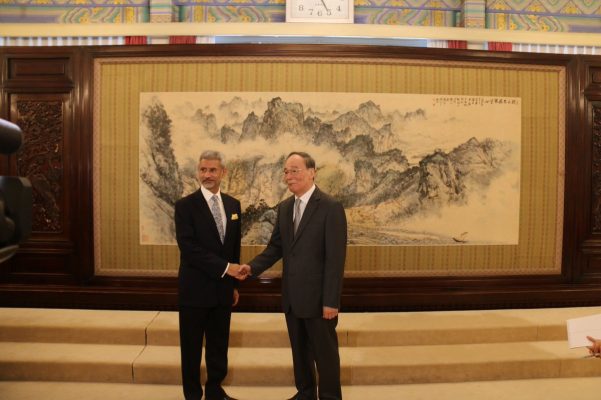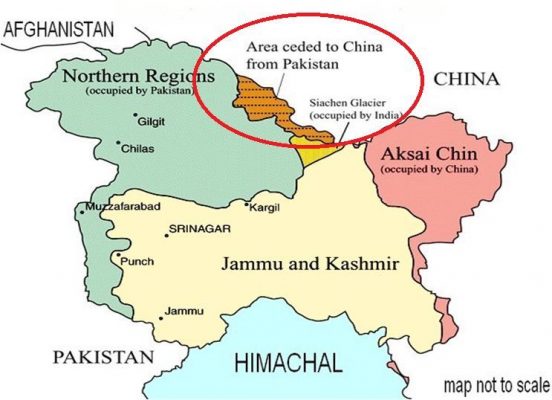
The issue of abrogating Article 370 and 35A of the Indian constitution has been discussed from various perspectives. Reality is: whatever decision has been taken regarding Jammu, Kashmir and Ladakh are internal matters of India. But considering the strategic significance of Kashmir and Ladakh, state of dominance of the made as per UN resolution, China getting certain part of Pak-Occupied Kashmir (PoK); all have contributed in fomenting up a critical situation and proved to be grave strategic and military concern for India. This has several dimensions; challenges from Pakistani army and ISI, terror outfits operating from Pakistan, provoking Kashmiri youths against India, China’s formidable military presence, increasing footprints of Islamic militia like ISIS and of course the unholy anti-India China-Pak nexus. Naturally, India had to deploy heavy security force prior to the legislation regarding Kashmir and adjoining region.
Reason behind India’s cautious approach becomes clear looking Pakistani reaction since the legislation was tabled in Indian Parliament. Imran Khan government called special session of Pakistani Parliament to decide future steps to confront India on this issue. This remained prime agenda in Pakistan since beginning. Pakistani strategy to counter India has been multi-porn; showing solidarity with the people of Kashmir in the name of Islam, appealing Islamic nations standing against India for the so-called atrocities against Kashmiri Muslims, conventional war-cry, and so on. But the most important point was getting support of China to raise the issue in the UN Security Council (UNSC).

This is true that Pakistan has not succeeded in provoking other Islamic nations nor Washington has made any clear statement regarding this. But China has formally asked for closed consultations in the UN Security Council to discuss the issue. Apparently, this may seem that China has done so to satisfy Pakistan. But this is contrary to Chinese policy. Beijing always takes decision to feed its strategic agenda. This time, it is no exception. A day after Kashmir legislation, Beijing stated that it is “seriously concerned” specifically pointing Ladakh becoming a separate Union Territory. This shows that behind the intension of dragging the issue to the UN, China has specific strategic interests.
But in every form, this is a challenge for New Delhi both on the strategic and military fronts. It is a diplomatic challenge as well. India certainly does not want any confrontation with China. But this is also true that India-China bilateral relations have not proved productive despite External Affairs Minister S Jaishankar’s three-day China visit after the legislation had passed. This was to finalise arrangements for President Xi’s visit to India later this year. But considering China’s decision of supporting Pakistani point regarding Kashmir in the UN, timing of Dr Jaishankar’s China visit looks a defensive step of New Delhi.

All these demand India’s pro-active approach on the strategic and diplomatic fronts. But what are the options before India? This depends on New Delhi’s priority. If New Delhi wants to maintain the current status quo in Kashmir; it seems no external challenge. Pakistan will definitely try to sabotage India’s interests through illegal penetration. But the volatile region of Kashmir coming under the direct rule of New Delhi will certainly provide upper hand to India. Pakistani propaganda of atrocities of Kashmiri Muslims can be neutralised exposing the reality of Muslim population of PoK, overall condition of so-called Muhajir (Muslim immigrants from India to Pakistan) and the pathetic state of religious minorities in Pakistan. Chinese assertiveness may be answered through highlighting atrocities against the Muslims in Xinjiang Province. So also, India does not need to ratify her legitimate claim in Jammu, Kashmir and Ladakh in the UN.
But if India is really serious to take back PoK, parts Gilgit-Baltistan, Aksai Chin, Trans-Karakoram Tract and some other adjoining parts as Home Minister Amit Shah stated in Parliament, India will have to chalk out larger strategic and military plans.

Pakistan has greater strategic leverage in this region. So also, PoK is important for China for land-route connecting West Asia. China has formidable military presence here. All these may result in a conventional war in this north-western border of India. This is true that taking entire Kashmir under India’s dominance will open much-needed land route between India and West Asia. But in the same breath one must admit that this will result in India’s geo-strategic proximity with other trouble-torn regions of the Islamic World; through Afghanistan.
But all these do not mean that India should stop efforts of making strategic endeavour to get the entire region. But from this year’s Independence Day speech of Prime Minister Narendra Modi, one thing became clear that in the given time India will opt for diplomatic initiatives. PM Modi has done really well by not mentioning the name of Pakistan or China rather stressed the need for a holistic approach of military modernisation along with attaining higher economic status. This is a realistic approach. Importance of Indian market will certainly compel China and others to reconsider strategy. When the issue will be discussed in the UN, India will certainly read the mindset of other stakeholders and make diplomatic work with intensity to crack the bond between China and Pakistan. So if Pakistan barks on war, let it. Why should India bother?
The author is a Guwahati-based strategic affairs expert and writer of ‘India’s Fragile Foreign Policy towards Neighbouring Nations’ & ‘Modi’s Rule and India’s Unbound Opportunities: Narrative of the Substantives and Beyond’








